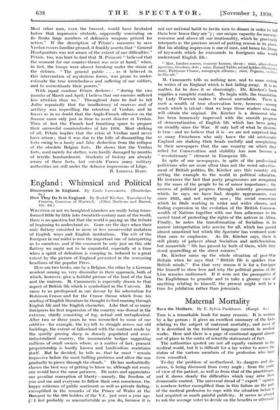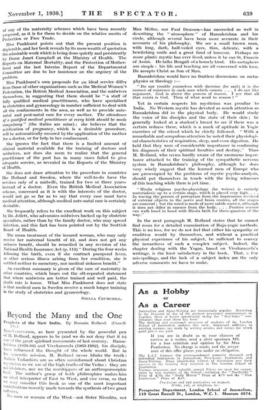Maternal Mortality
Save the Mothers. By E. Sylvia Pankhurst. (Knopf. Os.) Tuns is a remarkable book for many reasons. It is written by a lay person ; it gives an excellent summary, of the facts relating to the subject of maternal mortality, and most of it is described in the technical language current in medical works. Here and there is a page of emotional appeal almost out of place in the midst of scientific statements of fact. The authorities quoted are not all equally eminent in the medical world, but it is difficult for a lay writer to assess the status of the various members of the profession who have been consulted.
To-day the problem of motherhood, its dangers and die asters, is being discussed from every angle ; from the point of view of the patient, as well as from that of the practitioner, and it shows clearly the difficulties which may arise from democratic control. The universal dread of " expert " opinion is nowhere better exemplified than in this failure on the part of the medical profession to cope with the situation before it had acquired so much painful publicity. -It seems as absurd to ask the average voter to decide on the benefits or otherwise of any of the maternity schemes which have been recently proposed, as it is for them to decide on the relative merits of Protection or Free Trade.
Miss Pankhurst points out that the present position is deplorable, and her book reveals by its mere wealth of quotation the admirable work which is being done quietly and persistently by Dame Janet Campbell at the Ministry of Health. The Reports on Maternal Mortality, and the Protection of Mother- hood and the last Interim Report of the Departmental Committee are due to her insistence on the urgency of the problem.
Miss Pankhurst's own proposals for an ideal service differ from those of other organizations such as the Medical Women's Federation, the British Medical Association, and the midwives themselves, in suggesting that there should be " a staff of fully qualified medical practitioners, who have specialized in obstetrics and gynaecology in number sufficient to deal with all the confinements in the area, as well as to provide ante- natal and post-natal care for every mother. The attendance of a qualified medical practitioner at every birth should be made ronipulsory" (the italics are mine) ; she believes that the notification of pregnancy, which is a desirable procedure, will be automatically ensured by the application of the mother for a doctor, or for help in her confinement.
She ignores the fact that there is a limited amount of clinical material available for the training of doctors and midwives, nor does she seem to realize that the general practitioner of the past has in many cases failed to give adequate service, as revealed in the Reports of the Ministry of Health.
She does not draw attention to the procedure in countries like Holland and Sweden, where the well-to-do have the services only of a midwife, trained for two or three years, instead of a doctor. Even the British Medical Association scheme, concerned as it is with the interests of the doctor, would not go so far as to say that every case must have medical attention, although medical ante-natal care is certainly desirable.
She frequently refers to the excellent work on this subject by Dr. Jellett, who advocates midwives backed up by obstetric specialists, rather than by the family doctor, who may spread infection, and this fact has been pointed out by the Scottish Board of Health.
The mean treatment of the insured woman, who may only receive her maternal benefit of £2, and does not get any sickness benefit, should be remedied in any revision of the National Health Insurance Act (p. 113) During the four weeks following the birth, even if she contract puerperal fever, or other serious illness arising from her condition, she is entitled neither to monetary, nor medical sickness benefit."
An excellent summary is given of the care of maternity in other countries, which bears out the oft-repeated statement that where midwives arc better trained and well paid, the death rate is lower. What Miss Pankhurst does not state is that medical men in Sweden receive a much longer training in the study of obstetrics and gynaecology.
STELLA CHURCHILL.











































 Previous page
Previous page